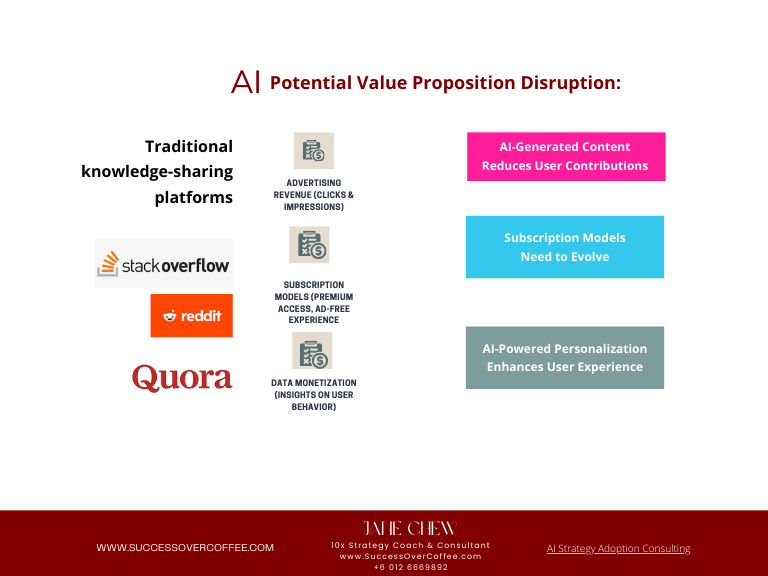
Artificial Intelligence (AI) is revolutionizing business models, including how companies structure their offers and value propositions. One significant shift is in knowledge exchange platforms, where users share expertise and insights. Platforms like Stack Overflow, Quora, and Reddit have built their businesses around user-generated content, but AI is disrupting their revenue streams and engagement strategies.
The Rise of AI in Knowledge Exchange Platforms
Traditional knowledge-sharing platforms thrive on the exchange of expertise between users. Experts provide answers, insights, and solutions, while other users consume and engage with this content. These platforms monetize through:
- Advertising revenue (clicks & impressions)
- Subscription models (premium access, ad-free experiences)
- Data monetization (insights on user behavior)
However, AI is now reshaping how users access, generate, and consume knowledge, impacting the business models of these platforms.
1. AI-Generated Content Reduces User Contributions
With the rise of AI chatbots like ChatGPT, Bard, and Claude, users can now get instant answers without relying on community-driven platforms. Instead of waiting for an expert response, AI can:
- Generate detailed, well-structured answers instantly
- Summarize multiple viewpoints in seconds
- Provide step-by-step solutions without requiring user engagement
Impact on Business Offers:
- Declining User Engagement: If AI can answer questions instantly, fewer users will contribute or visit platforms like Stack Overflow and Quora.
- Reduced Ad Revenue: Lower traffic and engagement lead to fewer ad impressions and lower click-through rates.
- Shifting Monetization Strategies: Companies must rethink how they provide unique value beyond AI-generated content.
2. Subscription Models Need to Evolve
Many platforms offer premium memberships that provide benefits such as ad-free browsing, exclusive content, and direct access to experts. However, AI is challenging this model by:
- Offering free, high-quality content generation
- Automating research and expert-level responses
- Reducing the perceived need for paid memberships
Impact on Business Offers:
- Need for Exclusive Human Expertise: Platforms must differentiate by offering human-verified or expert-curated content.
- Integration of AI Tools: Some companies are incorporating AI as a premium feature, offering AI-assisted research, personalized summaries, or AI-generated reports.
- Community-Based Learning: A shift towards mentorship, live discussions, and expert-led webinars rather than static Q&A forums.
3. AI-Powered Personalization Enhances User Experience
AI-driven platforms are leveraging personalization to create unique offers. Instead of traditional one-size-fits-all content, AI can:
- Recommend highly relevant discussions based on user behavior
- Provide personalized learning paths or topic summaries
- Automate content moderation to improve quality and trust
Impact on Business Offers:
- Higher Engagement Through Personalization: Users are more likely to engage with content that is tailored to their interests.
- New Monetization Strategies: AI-powered insights can help companies offer premium knowledge-based products like AI-generated industry reports.
- Shifting from Q&A to Insights: Companies can focus on providing deeper analytics, discussion summaries, and trend analysis rather than just raw user-generated content.
4. The Shift Towards AI-Assisted Knowledge Workflows
Many professionals used knowledge-sharing platforms to find solutions for work-related tasks, such as coding problems, industry best practices, or troubleshooting guides. AI has significantly impacted this by:
- Automating routine problem-solving (e.g., AI writing code snippets)
- Generating quick summaries of long discussions
- Offering instant explanations without requiring human answers
Impact on Business Offers:
- Stack Overflow and Coding Forums: Developers now rely on AI-assisted coding tools like GitHub Copilot, reducing their need to ask questions online.
- Reddit & Quora: AI-powered research assistants can summarize entire threads, reducing the need for direct platform engagement.
- New Business Models Emerging: Companies might shift toward AI-powered expert validation services, AI-assisted consulting, or curated learning experiences.
How Can Businesses Adapt?
To stay competitive in an AI-driven world, companies that rely on knowledge exchange must adapt their business models by:
- Integrating AI as a Feature, Not a Competitor: Instead of competing with AI, platforms can use AI to enhance user experience through automated recommendations, content summarization, and intelligent search.
- Emphasizing Human-Curated Expertise: AI-generated content lacks real-world experience, intuition, and nuanced discussion. Platforms can position human expertise as a premium offering.
- Building Community Engagement Beyond Q&A: Platforms can focus on live discussions, mentorship programs, and industry-specific networking opportunities.
- Shifting to Insight-Based Revenue Models: AI can analyze trends, generate reports, and provide businesses with actionable insights, creating new opportunities for monetization.
Conclusion
AI is disrupting traditional business offers by automating knowledge exchange, reducing reliance on user-generated content, and challenging established monetization models. However, businesses that embrace AI as a tool rather than a threat can redefine their value propositions and create AI-enhanced business models that remain relevant in the digital age.
🚀 Is your business adapting to AI-driven transformations? Let’s discuss how you can integrate AI into your business model!

Comments